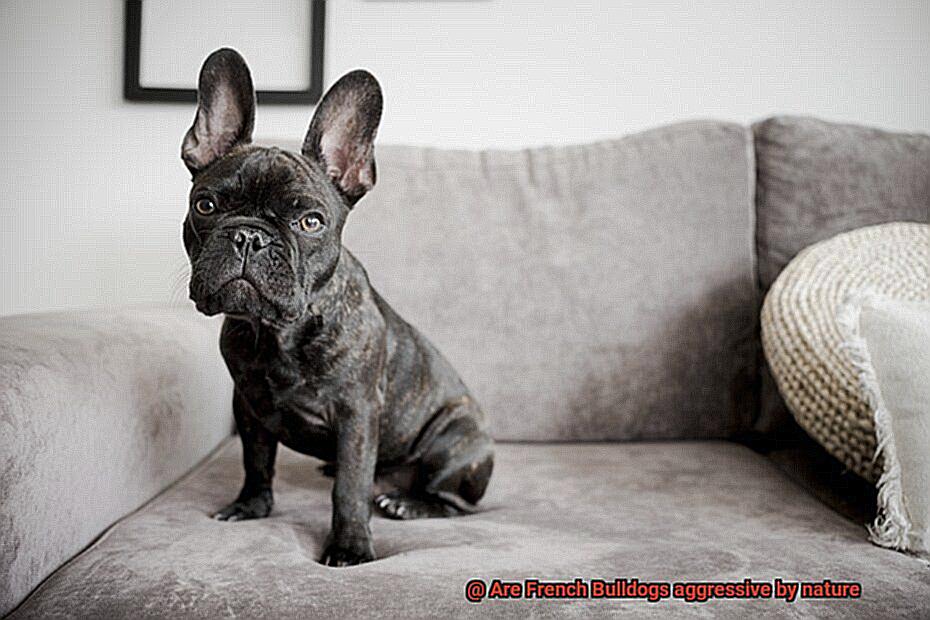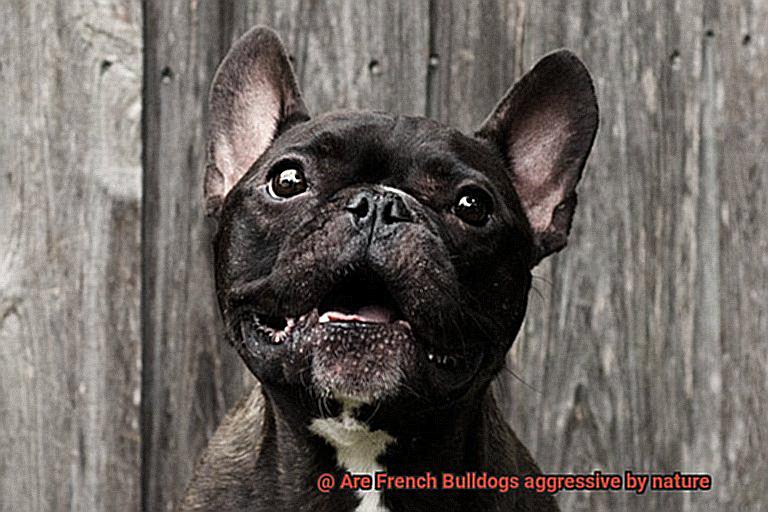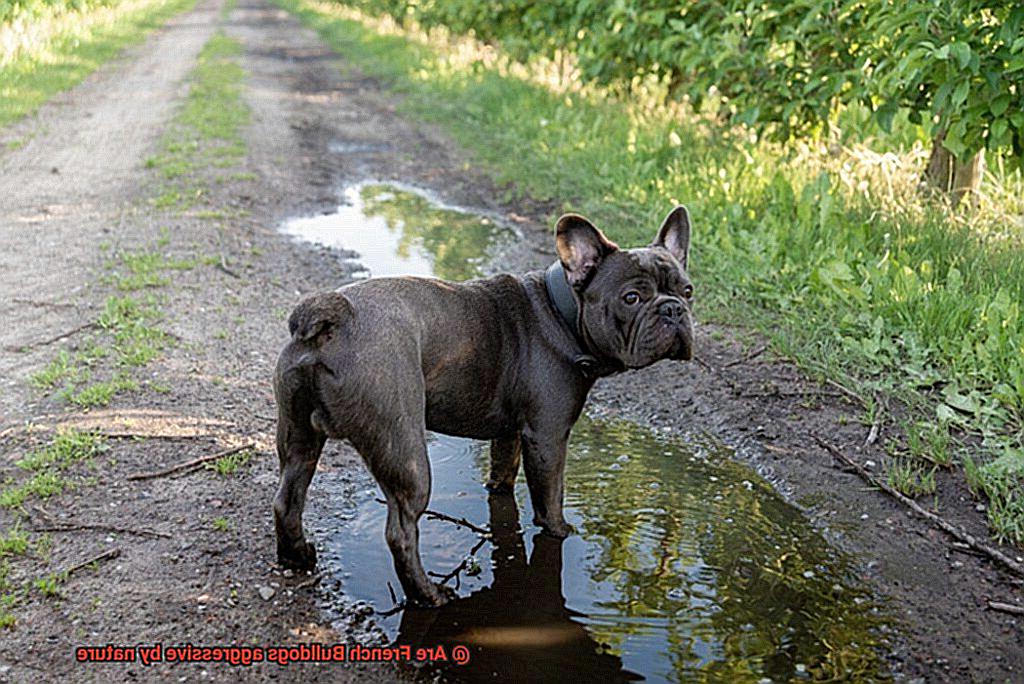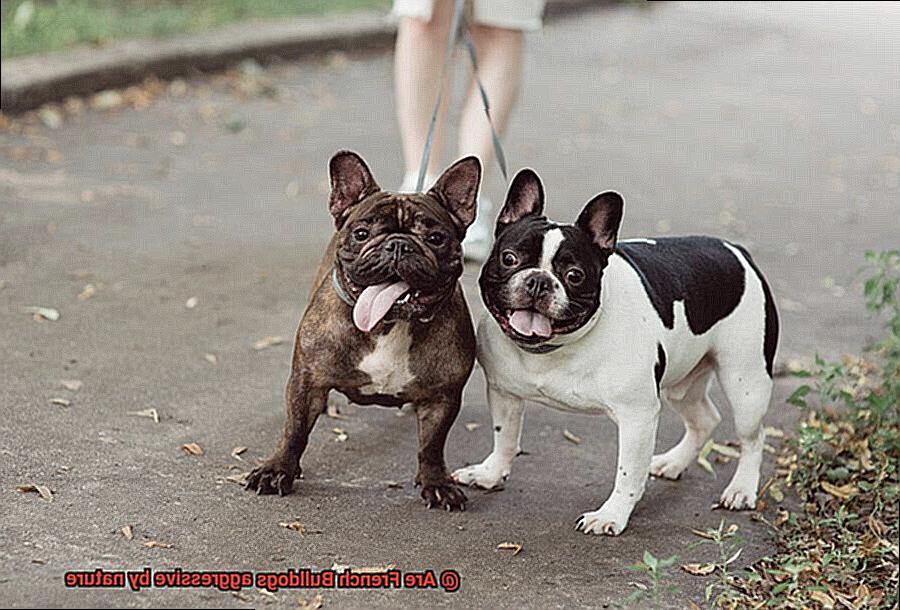Are French Bulldogs aggressive by nature?
French Bulldogs, with their iconic bat-like ears and irresistible charm, have skyrocketed in popularity as beloved companions. Yet, persistent misconceptions surround their temperament, often painting them as inherently aggressive. As a canine behavior expert, it’s my duty to debunk these myths and shed light on the true nature of French Bulldogs.
In this blog post, we’ll delve deep into the heart of this breed’s reputation, exploring their unique character traits, innate instincts, and socialization needs. By dispelling common misconceptions and providing accurate information, we aim to empower both current and prospective French Bulldog owners to forge a harmonious bond with these delightful canines.
So, buckle up for an enlightening journey as we unravel the truth about French Bulldogs and discover whether aggression is truly in their nature.
Are French Bulldogs Naturally Aggressive?
Contents
- 1 Are French Bulldogs Naturally Aggressive?
- 2 Factors That Affect a French Bulldog’s Temperament
- 3 Socialization and Training for French Bulldogs
- 4 The Benefits of Early Socialization for Frenchies
- 5 Tips to Help Prevent Fear-Based Reactions in French Bulldogs
- 6 Keeping Your Frenchie Entertained and Engaged
- 7 How to Recognize Aggression in French Bulldogs
- 8 Potential Solutions for Dealing with Aggressive Behavior in Frenchies
- 9 Conclusion
French Bulldogs, also known as “Frenchies,” are beloved for their charming and affectionate nature. However, there is a common misconception that they are naturally aggressive. In this blog post, we will explore the truth behind this myth and provide valuable insights on why French Bulldogs are not naturally aggressive but may display aggression due to various factors.
Understanding the Nature of French Bulldogs:
French Bulldogs are renowned for their friendly and sociable temperament. They are excellent family pets and typically get along well with children and other animals. While individual personalities may vary, French Bulldogs are generally gentle and easygoing.
Factors Influencing Aggression:
- Genetics: While French Bulldogs are not bred for aggression, it is crucial to choose a responsible breeder who prioritizes temperament in their breeding program.
- Socialization: Proper socialization from a young age is essential in preventing aggressive behavior. Exposing French Bulldogs to different people, animals, and environments helps them develop appropriate responses in various situations.
- Training: Consistent and positive reinforcement training methods establish boundaries, reinforce good behavior, and prevent or correct aggressive tendencies.
- Environmental Factors: A nurturing environment with companionship and mental stimulation is vital for a well-rounded French Bulldog.

The Importance of Socialization:
Early socialization plays a significant role in shaping a French Bulldog’s behavior. Gradual exposure to new situations and positive experiences help prevent fear-based reactions and promote confidence.

Separation Anxiety versus Aggression:
French Bulldogs thrive on human companionship and may exhibit undesirable behaviors such as excessive barking or destructive chewing when left alone for extended periods. These behaviors are more likely due to separation anxiety rather than aggression.
Factors That Affect a French Bulldog’s Temperament
French Bulldogs, or “Frenchies,” are renowned for their lovable and affectionate nature. While they may have a reputation for being aggressive, it is essential to understand that a French Bulldog’s temperament is influenced by various factors. In this blog post, we will explore these factors and provide insights based on firsthand knowledge and experiences to help you foster a well-balanced and happy French Bulldog.
Genetics:
Just like humans, dogs inherit certain traits from their parents. A French Bulldog’s temperament can be influenced by their genetic makeup. It is crucial to choose a reputable breeder who focuses on breeding dogs with good temperaments to reduce the likelihood of aggression in French Bulldogs.
Socialization:
Early socialization plays a pivotal role in shaping a French Bulldog’s temperament. Exposing them to different people, animals, and environments during their early stages of life helps them develop into well-rounded and friendly dogs. Proper socialization prevents fear or aggression issues later in life.
Training and Discipline:
Training methods have a significant impact on a French Bulldog’s temperament. These adorable pups respond well to positive reinforcement techniques, such as rewards and praise. Harsh or punitive training methods can lead to fear or aggression problems. Consistent training and discipline will help your French Bulldog become a balanced and well-behaved companion.
Health Issues:
Certain health problems can affect a French Bulldog’s temperament. Pain or discomfort caused by conditions like hip dysplasia or allergies can make them more irritable or aggressive. Regular vet check-ups and addressing any health concerns promptly are crucial for maintaining a stable temperament.
Owner’s Behavior:
Dogs are highly perceptive creatures, picking up on their owner’s emotions and reactions. A French Bulldog’s temperament can be influenced by the behavior and actions of their owner. If you consistently exhibit stress, anxiety, or aggression, it may negatively impact your dog’s behavior.
Environmental Factors:
The environment in which a French Bulldog lives also plays a role in their temperament. Living in a noisy or chaotic household, lack of exercise or mental stimulation, or isolation can contribute to behavioral issues like aggression. Providing a calm and structured environment, along with regular exercise and mental stimulation, is crucial for maintaining a stable temperament.
Socialization and Training for French Bulldogs
Socialization and Training for French Bulldogs: Unlocking the Charm of the “Frenchies”
Bonjour, fellow French Bulldog enthusiasts. If you’ve ever wondered why socialization and training are important for our beloved “Frenchies,” then your search ends here. As an expert in all things French Bulldog, I’m here to share my knowledge and experiences on this crucial topic.
Socialization: The Key to a Happy and Well-Adjusted Frenchie
Just like a baguette needs time to rise, French Bulldogs need proper socialization to thrive. Socialization involves exposing them to a variety of people, animals, and environments from an early age. This helps them develop confidence and adaptability, ensuring they become friendly and well-behaved companions.
Here are some paw-some tips for socializing your French Bulldog:
- Puppy Classes: Enroll your Frenchie in puppy classes or group training sessions. These provide a controlled environment for them to interact with other dogs and humans, fostering positive social skills.
- Playdates: Arrange playdates with well-behaved dogs of different breeds. This will help your Frenchie learn how to communicate and interact appropriately with others.
- Out and About: Take your Frenchie on regular outings to parks, cafes, or pet-friendly stores. Exposing them to different sights, sounds, and smells will broaden their horizons and prevent fear-based aggression.
Training: Unleashing the Intellectual Brilliance of French Bulldogs
While our “Frenchies” may have a reputation for being stubborn like a mule, they are actually intelligent dogs who thrive on mental stimulation. Training provides them with clear boundaries and helps establish you as the pack leader.
Here’s how you can train your Frenchie to be the crème de la crème:
- Positive Reinforcement: Use treats, praise, and playtime as rewards for desired behaviors. This positive approach encourages your Frenchie to repeat good manners and tricks.
- Consistency is Key: Establish a routine and use consistent verbal cues for commands like sit, stay, come, and leave it. This will help your Frenchie understand what is expected of them.
- Short and Sweet: Frenchies have a shorter attention span than a Parisian fashion show. Keep training sessions short but frequent to keep them engaged and focused.
Remember, every Frenchie is unique, just like a painting by Monet. While most French Bulldogs are friendly and sociable, some may exhibit aggression due to health issues or lack of proper socialization and training. If you notice any concerning behavior, don’t hesitate to seek professional help from a dog trainer or behaviorist.
The Benefits of Early Socialization for Frenchies
If you’ve got a Frenchie by your side, you already know how adorable and lovable these little clowns can be. But did you know that early socialization is a key ingredient in shaping their pawsitive personalities? Just like a perfectly baked croissant, early socialization helps Frenchies develop into well-rounded and adaptable dogs. Let’s dig into the benefits of early socialization for our furry friends.
- Reduces Aggression Issues: Picture this – a French Bulldog strutting down the street with a wagging tail and a friendly demeanor. Early socialization during the critical developmental period of 3 to 14 weeks can significantly reduce the likelihood of aggression issues. By exposing them to different people, animals, and environments, we mold them into sociable and non-aggressive companions.
- Creates Well-Rounded Pooches: Socialization exposes our Frenchies to a smorgasbord of stimuli, from different sounds to sights, smells, and textures. Just like us enjoying a variety of French cuisine, this exposure helps them become well-rounded dogs who can handle new experiences with ease.
- Builds Confidence in Unfamiliar Situations: We all know that French Bulldogs have a penchant for charming everyone they meet. By introducing them to different types of people – children, adults, and even strangers – we help our furry friends feel comfortable and confident around unfamiliar individuals.
- Fosters Positive Relationships with Other Animals: Who doesn’t love seeing their Frenchie frolic with other furry friends? Early socialization should also involve interactions with other dogs and animals. This helps them learn appropriate play behavior and establish paw-sitive relationships with their four-legged counterparts.
- Promotes Adaptability: Life is full of surprises, just like stumbling upon a hidden gem in the streets of Paris. By exposing our Frenchies to various environments like parks, beaches, and busy streets, we help them become more adaptable and less prone to fear or anxiety in new situations. It’s like giving them a passport to explore the world with confidence.
- Encourages Positive Reinforcement: Training our Frenchies during socialization is all about positive reinforcement. Just like rewarding ourselves with a delicious treat after a job well done, using positive reinforcement helps create a paw-sitive association with new experiences and reinforces desired behaviors.

Remember, socialization should be an ongoing process throughout your Frenchie’s life. Regular exposure to new situations and continued positive interactions will help maintain their sociability and prevent any aggression issues from sneaking in.
Tips to Help Prevent Fear-Based Reactions in French Bulldogs
French Bulldogs, also known as “Frenchies,” are beloved companion pets known for their friendly and affectionate nature. While they are not inherently aggressive, fear-based reactions can occur if they are not properly socialized or have had negative experiences in the past. To ensure a confident and well-adjusted French Bulldog, it is crucial to focus on socialization, positive reinforcement training, creating a safe environment, consistency, and seeking professional help when needed.
Socialization for Confidence Building:
Proper socialization plays a crucial role in preventing fear-based reactions. Expose your French Bulldog to different people, animals, and environments from an early age. Puppy socialization classes, regular walks in various settings, and controlled introductions to new experiences can help them become more confident and less fearful.
Positive Reinforcement Training:
Use reward-based training methods to encourage desired behaviors rather than punishing undesirable ones. Treats, praise, and play as rewards will help French Bulldogs associate positive experiences with certain situations, reducing their fear response and building their confidence.
Creating a Safe Environment:
Provide your French Bulldog with a comfortable space where they can retreat when feeling overwhelmed or anxious. Avoid forcing them into situations that make them uncomfortable and allow them to approach new experiences at their own pace. A safe environment helps alleviate fear-based reactions.
Consistency and Routine:
Establishing a predictable daily routine provides French Bulldogs with a sense of security and stability. Regular feeding times, exercise schedules, and play sessions help reduce stress and anxiety. Consistency allows them to feel more comfortable in their surroundings.
Proper Socialization with Other Dogs:
Negative experiences or lack of exposure to other dogs can contribute to fear-based reactions. Introduce your French Bulldog to well-mannered and friendly dogs in controlled environments. This allows them to develop positive associations with canine companionship and reduce fear-based reactions.
Professional Help:

In some cases, professional help may be necessary to address fear-based reactions. Consult with a certified dog trainer or behaviorist who can develop a customized training plan and offer techniques to help desensitize and counter-condition your French Bulldog to their fears.
Keeping Your Frenchie Entertained and Engaged
If you’re looking for ways to keep your Frenchie entertained and engaged, you’ve come to the right place. As an expert in all things French Bulldog, I’ve got some paw-some tips and tricks up my sleeve that will have your furry friend wagging their tail with joy. So, grab a cup of coffee (or a treat for your Frenchie) and let’s dive right in.
Interactive toys are like a mental gym for your Frenchie. Puzzle toys, treat dispensers, and hide-and-seek games will challenge their problem-solving skills while keeping them entertained for hours. It’s like giving their little brains a workout while they enjoy a tasty reward.
Training Sessions: Bonding Time with a Side of Learning.
Frenchies are smart cookies, and they love showing off their smarts. Engage in short training sessions throughout the day to keep their minds sharp and strengthen the bond between you two. Plus, learning new tricks is a great way to impress your friends at the dog park.
Physical Exercise: Let’s Get Moving.
Just like us, French Bulldogs need their daily dose of exercise to stay fit and healthy. Take them for a walk or let them run around in a secure yard to burn off excess energy. And don’t forget to throw in some fun games like fetch or tug-of-war – it’s a win-win for both of you.
Socialization: Paw-ty Animals Unite.

Frenchies are social butterflies, and they love making new friends – both human and furry. Introduce them to different people, animals, and environments from an early age. Puppy socialization classes or trips to the dog park can provide opportunities for positive social interactions and prevent any aggressive behavior.
Mental Stimulation: Treats for the Mind.
Food-dispensing toys and treat puzzles are like a treasure hunt for your Frenchie. By making them work for their food, you’re not only keeping them mentally engaged but also tapping into their natural hunting instincts. Hide treats around the house and watch as they use their super-sniffing powers to find them all.
How to Recognize Aggression in French Bulldogs

French Bulldogs are beloved for their friendly and sociable nature, but like any dog, they can exhibit aggression in certain situations. Recognizing and understanding aggression in French Bulldogs is crucial for the safety and well-being of both the dog and its owners. In this article, we will explore the signs of aggression in French Bulldogs and provide tips on how to address and manage this behavior.
Body Language: The Language of Aggression
When a French Bulldog is feeling aggressive, their body language can give important clues. Look for signs such as a stiff posture, raised hackles, a rigid tail, and intense staring. These physical cues indicate that the dog is on high alert and ready to engage in aggressive behavior if provoked.
Vocalizations: Listen to the Warning Signs
Growling, barking aggressively, or snarling are clear indications that your French Bulldog is feeling threatened or agitated. These vocalizations should be taken seriously as they often serve as warnings before potential bites or attacks.
Context Matters: Identify Triggers
Understanding the specific triggers that cause aggression in your French Bulldog is key to managing and preventing such situations. Aggression can be triggered by fear, territoriality, or resource guarding. Identifying these triggers allows you to address the underlying causes and take necessary precautions.
Seek Professional Help: Addressing Aggression
If your French Bulldog displays aggressive behavior towards people or other animals, it is essential to seek professional help from a qualified dog trainer or behaviorist. They can provide valuable guidance on how to manage and modify your dog’s aggressive tendencies safely and effectively.
Socialization and Training: The Keys to Prevention
Proper socialization from an early age helps prevent fear-based aggression by exposing your French Bulldog to various environments and situations. Consistent positive reinforcement training methods can also help curb aggressive tendencies and promote desirable behaviors.
Potential Solutions for Dealing with Aggressive Behavior in Frenchies
French Bulldogs are typically known for their friendly and sociable nature. However, aggression can sometimes be a challenge for these adorable pooches. In this blog post, we will explore potential solutions for dealing with aggressive behavior in French Bulldogs, helping you create a safe and harmonious environment for both your furry friend and your family.
Early Socialization:
Early socialization plays a crucial role in preventing aggression in French Bulldogs. Introduce them to various people, animals, and environments from a young age to help them build positive associations. This helps reduce the likelihood of aggressive behavior later on.
Training:
Consistent and positive reinforcement-based training methods are vital for managing aggression in French Bulldogs. Establish clear boundaries, reinforce desired behaviors, and discourage aggressive tendencies through rewards and redirecting their focus.
Identify Triggers:
Understanding the triggers for aggression is essential. Identify situations, objects, or actions that provoke aggressive behavior in your French Bulldog. By avoiding or managing these triggers effectively, you can minimize instances of aggression.
Seek Professional Help:
Don’t hesitate to seek professional assistance from certified dog trainers or behaviorists. Their expertise can provide personalized training plans and techniques tailored to your French Bulldog’s specific needs.
Implement Management Strategies:
Using tools like muzzles or leashes can be helpful in preventing potential harm while working on behavior modification. These tools ensure the safety of others while allowing you to manage and address your Frenchie’s aggression.
Provide a Structured Routine:
Creating a structured routine and consistent environment can reduce stress and anxiety in French Bulldogs, minimizing the likelihood of aggression. Regular exercise, mental stimulation, and a designated safe space contribute to their overall well-being.
Rule Out Medical Issues:
Sometimes, underlying medical conditions can contribute to aggressive behavior. Consult with a veterinarian to rule out any medical causes and receive appropriate treatment if necessary.
Understand Canine Communication:
Educate yourself about canine body language and communication. Recognizing the warning signs of aggression allows you to intervene early and maintain the safety of your Frenchie and those around them.
U9FfZtV10_Y” >
Conclusion
In conclusion, it is important to understand that French Bulldogs are not inherently aggressive by nature. While they may display occasional signs of aggression, these behaviors are typically a result of external factors such as poor training or socialization. With proper care, training, and socialization, French Bulldogs can be friendly, affectionate, and well-behaved companions.
It is crucial to debunk the misconception that all French Bulldogs are aggressive. Like any other breed, their behavior is influenced by various factors including genetics, environment, and upbringing. While some individuals may have a predisposition towards aggression due to their genetic makeup or past experiences, this does not mean that the entire breed is aggressive.
French Bulldogs are known for their friendly and sociable nature. They thrive on human companionship and love being part of a family. However, like any dog breed, they require proper training and socialization from an early age to ensure they grow up to be well-rounded pets.
Training should focus on positive reinforcement techniques rather than punishment-based methods. This helps build trust between the owner and the dog while reinforcing desired behaviors. Consistency is key when it comes to training French Bulldogs as they can be stubborn at times.
Socialization plays a crucial role in shaping a French Bulldog’s temperament. Exposing them to various people, animals, sounds, and environments from a young age helps them develop confidence and adaptability. It also reduces the likelihood of fear-based aggression towards unfamiliar situations or individuals.
It is worth noting that every dog is an individual with its own personality traits. While French Bulldogs generally have a friendly disposition, there may be exceptions where certain individuals exhibit more aggressive tendencies due to specific circumstances or underlying health issues.
In summary, French Bulldogs are not inherently aggressive by nature. Their behavior largely depends on how they are raised and trained by their owners.




